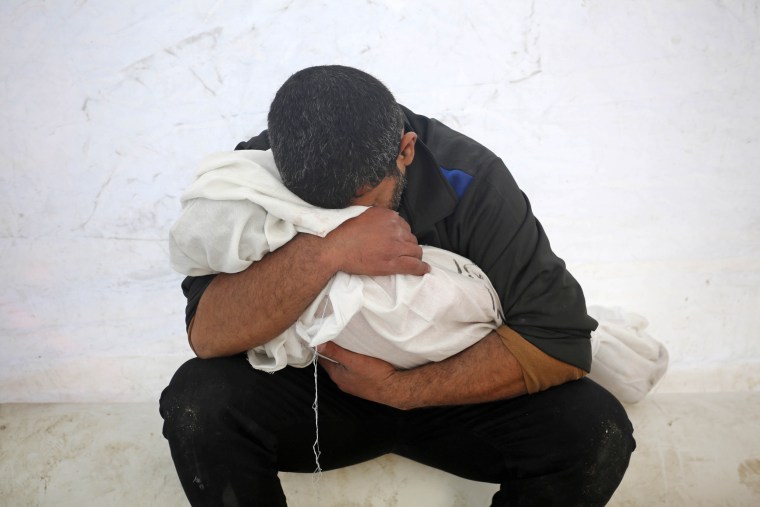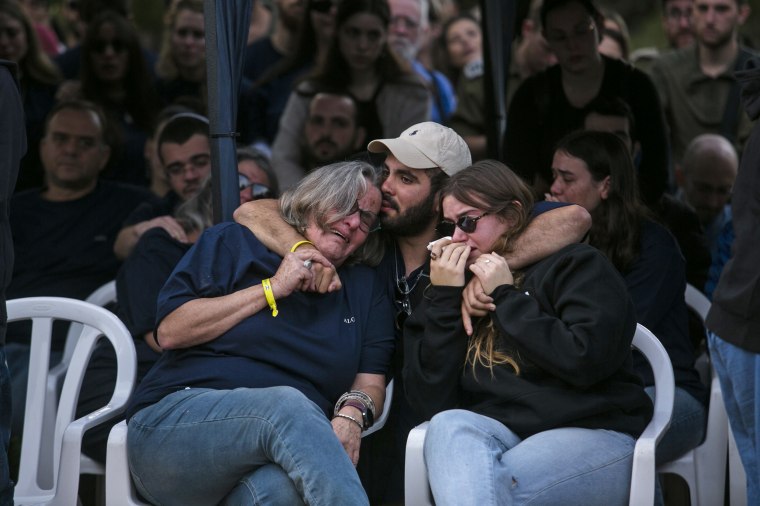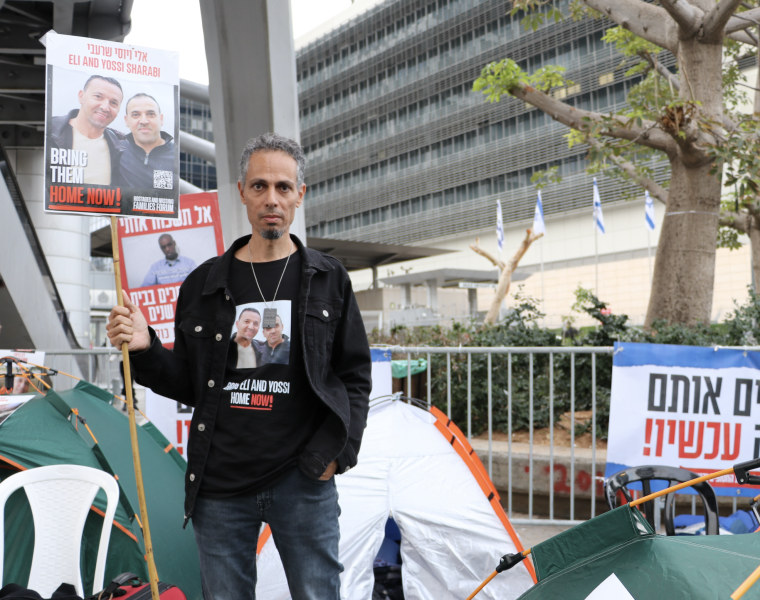TEL AVIV — About 20,000 people have been killed in Gaza since Oct. 7, according to the Palestinian Health Ministry, the result of Israel’s bombing campaign and ground invasion after Hamas’ terror attack.
The Israel Defense Forces’ near-relentless assault has displaced around 90% of the population and leveled 40,000 buildings, according to United Nations estimates, and is enabling what the organization calls an unfolding humanitarian disaster for Palestinian civilians who are searching for shelter, food, clean water and medical care.
Some 70% of those killed were women and children, the Health Ministry said. The numbers did not include many dead who are still buried in the rubble of bombed buildings, it added in a statement.
Throughout the war, health officials have released precise numbers of dead and injured. This changed Wednesday and Thursday, when they announced an estimate.
The grim milestone came 75 days after Hamas launched multipronged surprise attacks on Israel that left 1,200 people dead, according to officials in the country.

Around 240 people were also take hostage by the militant group, with more than 100 of them being freed during a pause in fighting late last month in exchange for Palestinian prisoners held in Israel. Some said there had been a shortage of food while they were held, while others said they had been mistreated by their captors.
More than 120 people are believed to remain in Hamas’ captivity, according to the latest figures from Prime Minister Benjamin Netanyahu’s office.
Describing Gaza as “the deadliest place for civilians in the world at this point in time,” George Readings, the International Rescue Committee’s lead crisis analyst, told NBC News in a phone interview Tuesday that the scale of the devastation was “intolerable.”
As of Thursday, only nine of Gaza’s 36 hospitals were partially functional, according to the World Health Organization.
Rising death toll, mounting criticism
Netanyahu has vowed to continue the country’s offensive in Gaza until every hostage is freed and Hamas is eliminated from the enclave. But he is coming under mounting pressure from the United States and the international community to pause or end the fighting.
In perhaps his harshest criticism of Israel yet, President Joe Biden said earlier this month that Netanyahu’s government was “starting to lose that support by the indiscriminate bombing that takes place.”
In comments during an off-camera campaign reception in Washington, Biden also suggested that the Israeli government was blocking progress toward a long-term solution, with far-right members in his Cabinet expressing opposition to a two-state solution.
Biden’s opinion is “the only one that really matters” on the international stage, Paul Salem, president of the Middle East Institute, a Washington-based think tank, said Monday. As the only country actively supporting Israel, the U.S. is “the only one that could actively and seriously pressure Israel into a cease-fire,” he said.
He added that in other Middle Eastern countries, public opinion toward Israel had been “massively enraged” by the war in Gaza, and “not one generation but several generations, have been marked in a deep, deep way.”
“I cannot recall when an Israeli war had such an impact,” he said. “Previous Israeli wars were much briefer,” he said, adding this was something Israel — which has normalized relations with several of its neighbors and was attempting to build bridges with several others — would have to take into account.
Within Israel, Netanyahu’s approval ratings have also plummeted in recent weeks, with his government facing public anger over its failure to prevent the Oct. 7 attacks and its subsequent inability to secure the release of the remaining hostages.
This weekend’s announcement that the country’s military had mistakenly killed three hostages who were holding a white cloth on a stick fueled further outrage.

Alon Shamriz, Yotam Haim and Samer Talalka were shirtless when they were shot, an IDF official said Saturday. At least one of them cried out for help in Hebrew before they were killed, the official added.
Netanyahu is now under “enormous pressure” from his own people to “switch from a ground offensive,” Salem said, adding that with 20,000 deaths, “clearly by any Israeli standards shows they’ve exacted revenge” for the Hamas attacks.
Following the announcement that the three hostages had been killed, thousands of Israelis gathered on the streets of Tel Aviv outside Israel’s Defense Ministry to call on the country’s war Cabinet to do more to secure the release of those still being held by Hamas.
‘My hope was to go to school’
Inside Gaza, where the United Nations estimates that 90% or around 1.9 million of the population of about 2.2 million people have been displaced, Palestinians seeking refuge in the southern city of Rafah, which the Israeli military has designated a “safe zone,” say they too want peace and security.
“My hope was to go to school and other activities, but now my wish is for the war to end and go back to my house,” 12-year-old Rosan El Habash told NBC News’ crew on the ground Sunday.
“That’s my hope in this life,” she said.
The fear of not being able to return home — or being eventually forced to leave the Gaza Strip — is one that a growing number of Palestinians appear to share.
“I can’t leave my land,” Mays Abu Aisha said last week. “We lived in it and we will die in it.”
After leaving her home in northern Gaza, Abu Aisha said she moved to the city of Khan Younis after following Israeli advice to move south. After strikes on the city, she said she moved farther south to Rafah near the border with Egypt.
“If a country like Russia and Ukraine were at war, the whole world would stand with them and end the conflict,” she said. “Here in Gaza, no one stands with us.”
‘We want to be safe’
Among the crowd of hundreds in Tel Aviv demanding to see a plan of action from the government were the relatives of several hostages, including Raz Matalon, 53, whose brothers-in-law Eli Sharabi, 51, and Yossi Sharabi, 53, are still being held.
“This is a feeling of urgency that I never felt in my life,” Matalon, 53, told NBC News on Sunday, adding that Eli Sharabi’s wife, Lianne, and their two children, Yahel, 13, and Noiya, 16, were also killed that day. Yossi Sharabi’s wife and daughters survived the attack.

Matalon, who has camped outside the Defense Ministry alongside several other protesters on multiple nights, added that he wanted the fighting in Gaza to end and for Israel’s leaders to focus on negotiating a deal to secure the release of the remaining hostages.
Continuing to fight in Gaza could potentially be putting his loved ones at risk, he said, adding: “If we continue the war as it is, it is so dangerous for everyone, so we have to start the mechanism of releasing the hostages.”
After Hamas’ attacks, Matalon said, he was struggling to weigh his hopes for peace in the region with his fears.
“I want for the Palestinians a better life, a good life,” he said. But, “how can I let my family live next to the terrorists?” he said, referring to Hamas.
“We want to be safe,” he said. “We want to be secure.”
source